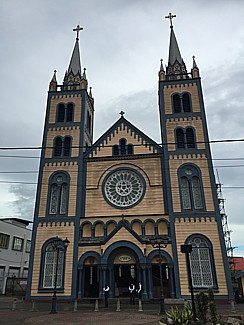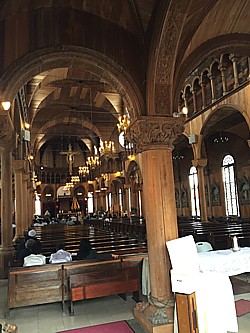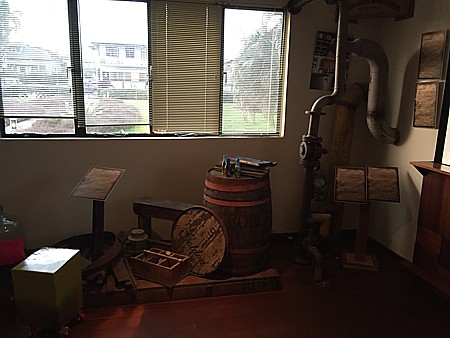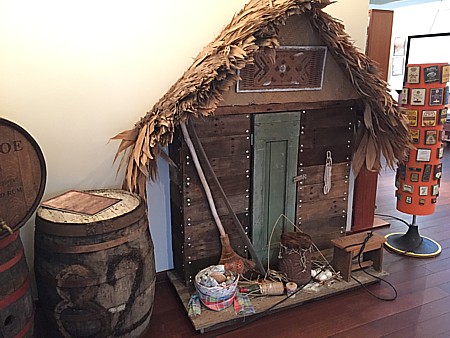Cathedral of Saint Peter and
Paul
Located on Henck Aaron
Street in Paramibo is the Saint Peter and Paul Cathedral, which is the
largest wooden structure in the Western Hemisphere. There is often
speculation as to whether Guyana or Suriname has the largest wooden
structure, however at 44 metres in the bell tower, the Saint Peter and Paul
Cathedral is half a metre taller than the Anglican
St George's Cathedral
on Church Street in Georgetown, Guyana. From the exterior it is certainly an
impressive structure and it has an interesting history.

The Cathedral is
constructed on the site of a former Dutch Jewish theatre, De Verrezene
Phoenix, which had been built in 1809 and had been bought by the Catholic
community for use as a church. In 1882 the Catholic diocese decided to build
a cathedral as the congregation had outgrown the theatre. For the design
they turned to Frans Hermes who had designed many of the churches in
Suriname. Construction of the cathedral began January 30, 1883 and it was
consecrated in 1885. The original building did not include the towers which
were added in 1901. The church was constructed of wood because lumber was
readily available from the Amazon rainforest that covers much of Suriname
whereas brick and stone was not easily available at the time.The exterior of
the church was built using greenheart lumber.
In the west tower
there are three bells.The name of the smallest bell is Alfhonsus and
it weighs 222 kg. The biggest bell is named John and it weighs
827 kg. The middle one is named Rosa, and it weighs 413 kg.

The interior of the
church is constructed on unpainted cedar. Throughout the interior are
numerous carvings in the wood. It is said that these carvings were done by
the Maroons (runaway slaves). During the days of slavery, the Dutch did not
allow the slaves to convert to Christianity. At the time of the Cathedral's
construction, slavery had been abolished 19 years previously and so to
attract the former slaves to the church, Maroons were contracted to do the
wood carvings.
Another feature of the
interior is that the columns are not constructed of cedar but rather
enclosed by cedar panels. The columns are actually made of basralocus wood
as they needed to be strong. The basralocus was the only local tree strong
and tall enough to support the 52-foot-high structure, but it is very thin
so for cosmetic reasons the pillars were enclosed in cedar wood planks to
create an impression of heavy columns.
There are one hour
guided tours of the Cathedral, twice per week on Tuesdays and Saturdays. The
tours are usually done in Dutch but can be given in English upon request.
Suriname Rumhuis
Life in the Caribbean and South
America has for centuries been linked to the cultivation of sugar cane and
this sweet grass is linked to that delicious nectar known as rum. But how is
rum produced and are all rums the same? The answers to these and other rum
questions can be found in Surinam at the Surinam Rum House.
Set back from the road at 18
Cornelis Jongbawstraat in central Paramaribo and on the banks of the
Suriname River, this multipurpose facility combines a tropical garden and
terraces with a conference room, cocktail bar, tasting room and rum museum.
The Suriname Rum House is part of Suriname Alcoholic Beverages N.V. (SAB),
the producer of renowned Surinamese rums and is adjacent to the distillery.
At the Suriname Rumhuis, as they describe it "you can experience the story
from ‘sugar cane to liquid gold’”. Not only do you learn about how rum is
produced but you can see artifacts of the rum history at the rum museum. You
learn about the master blender who combines the elements of the secret
recipes, the coopers who assemble the oakwood barrels and the other elements
to go into producing rum. Open Monday to Friday from 9.30 am to 14.30, tours
are available in English and Dutch and also French (on request). Tours must
however be booked in advance. You can also request a tour of the rum
distillery.

As this is a facility dedicated to rum, it would not be complete without the
opportunity to taste the delicious rums. So each tour include a rum tasting
where you can smell, taste and enjoy the best rums of Suriname.

Do you want to learn how to make rum cocktails? Well at the Surinaamsch
Rumhuis you can register for a cocktail workshop and learn how to layer,
stir and shake to produce delightful cocktails.
To learn more about Suriname, see our other Suriname Pages